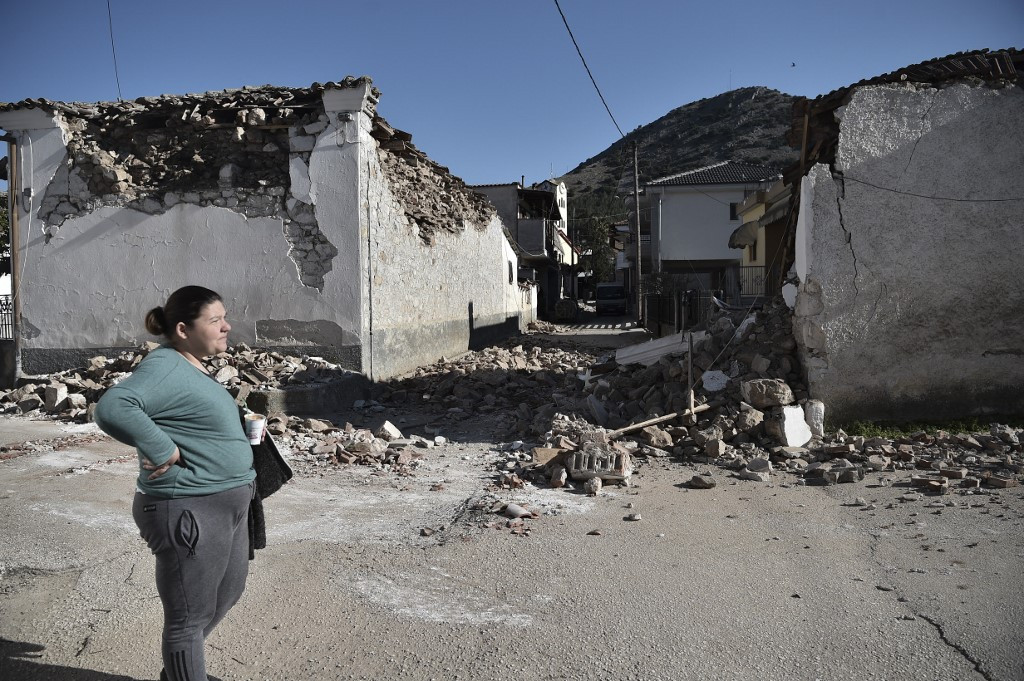Popular Reads
Top Results
Can't find what you're looking for?
View all search resultsPopular Reads
Top Results
Can't find what you're looking for?
View all search resultsStrong earthquake damages dozens of buildings in Greece
Change text size
Gift Premium Articles
to Anyone
A
strong 6.3-magnitude earthquake hit central Greece on Wednesday, injuring a dozen people, damaging scores of buildings and causing panicked crowds to rush into the streets.
The state ambulance service said it had given assistance to 10 lightly injured people. In the main city of Larissa, a 55-year-old man was hospitalized with head injuries after being hit by falling masonry, a local hospital supervisor told AFP.
At least a hundred homes and other buildings in the area including churches had been damaged, Costas Agorastos, regional governor for the broader Thessaly region, told AFP in the village of Damasi, near the epicentre of the quake.
There were several tales of narrow escapes in the area -- including an elderly disabled man who was rescued from his collapsed house in the nearby village of Mesochori, and 63 children in Damasi who hid beneath their desks as their school shook.
"Everything started shaking and then the blackboard toppled over," a 10-year-old pupil called Theodora told AFP.
"We ran out after awhile. Nearly all the children were crying and screaming until our parents came to collect us," she said.
Across the street from the school, the roof was most of what remained from a stone house whose front walls spilled onto the street. A chandelier was left hanging from the wood rafters.
Several aftershocks were reported after the main quake hit midday near the central city of Larissa, sparking panic in the area rarely troubled by serious earthquakes.
"Luckily I was working in the fields. I would not be alive otherwise," Thanos Mavrakis, a 39-year-old farmer, told AFP in Damasi.
"It was very scary," he said, gazing at his damaged stone house.
The civil protection authority also reported landslides in the region, and authorities were assessing further damage.
"Had this happened at night there would be deaths for sure," said Vaios Georgakis, 48.
"I was at my vineyard and I saw earth from the mountain fall in waves like the sea," he said.
Agorastos said tents would be set up at the Damasi sports stadium for people whose homes were damaged. Others were sent by bus to hotels in nearby towns.
The culture ministry said four churches, one of them dating from the 17th century, had been damaged, two of them seriously.
The US Geological Survey said the 12:16 pm (1016 GMT) earthquake, which was felt across mainland Greece, was magnitude 6.3.
But the Institute of Geodynamics in Athens said earlier the quake had measured at a magnitude of 6.0.
Turkish Foreign Minister Mevlut Cavusoglu called his Greek counterpart Nikos Dendias to convey solidarity and said Ankara was ready to offer support if needed.
Relations between regional rivals Greece and Turkey markedly improved in 1999 when both countries were struck by deadly earthquakes less than a month apart.
Last year, the countries also cooperated on recovery efforts after a strong earthquake struck in the Aegean Sea, killing scores and causing vast damage mainly in Turkey.
According to the Athens observatory, the epicentre of the quake was 16 kilometres (10 miles) south of the town of Elassona and was eight kilometres deep.
There were several aftershocks following the main tremor -- including one at magnitude 5.7 -- after authorities issued a warning.
"I believe the worst has been avoided," Efthymios Lekkas, head of Greece's quake protection authority, told state TV ERT.
"The aftershocks will continue for quite some time, (but) they will be smaller and less frequent," he said.
Experts stressed that fault lines in the area rarely produce tremors larger than the one clocked on Wednesday.
The last major earthquake in the area was in the 18th century and was magnitude 6.2, Manolis Skordilis, a seismologist at Thessaloniki's Aristotle University, told state agency ANA.
Greece is located on a number of fault lines, and is sporadically hit by earthquakes.
But the quakes often happen at sea and do not often kill people or cause extensive damage.
The last fatal earthquake was in October, when a magnitude 7.0 hit in the Aegean Sea between the Greek island of Samos and the city of Izmir in western Turkey.
Most of the damage was in Turkey where 114 people were killed and more than 1,000 injured.
In Greece, two teenagers were reported dead on the island of Samos.










